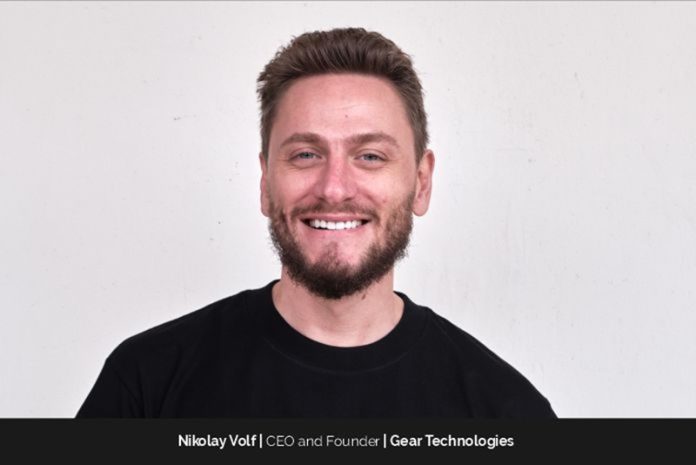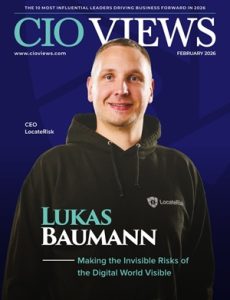Nikolay Volf wears the title of Founder and CEO of Gear Technologies, but deep down, he still thinks of himself as an engineer. He’s most comfortable solving problems, writing code, and turning abstract ideas into functioning systems.
What drives him is simple: the need to build things that work. His focus has always been on making useful tools, not chasing attention. Over the years, that mindset has drawn like-minded people to him, people who care about getting the technical details right and don’t mind putting in the time.
A Different Kind of Leadership
That’s how Gear Technologies began. A quiet pursuit of better infrastructure, shaped by years of experience and a desire to keep certain Web3 values intact: openness, transparency, and access for anyone who wants to contribute.
Nikolay’s approach has earned him respect among peers and competitors alike. But he doesn’t measure success by recognition. What matters to him is shipping something that holds up, seeing others use it, and knowing it serves a real purpose.
There’s also the personal side. For Nikolay, a good day starts with a clear head and ends with the feeling that something meaningful got done. “If I wake up with a smile,” he says, “I know I’m on the right track.”
Ask him to sum himself up in one word, and he picks “compassionate.” It’s not the answer you’d expect from someone who’s spent his life writing code. But it shows in how he leads, who he hires, and what kind of company he’s building.
From Young Programmer to Tech Founder
Nikolay’s relationship with programming began early. Before he had a sense of what a career even was, he was already glued to a computer. Nikolay loved building, experimenting, and breaking things to learn how they worked.
“When I was around twelve, I was writing in assembler,” he says. “I didn’t even think of it as programming. I just liked how things came together.”
That early curiosity turned into a full-time pursuit. His first job was in software, and he’s remained close to engineering ever since, writing code, contributing to projects, and tackling technical challenges head-on.
Before launching Gear Technologies, Nikolay spent time at Parity Technologies, where he worked as a Core Developer. He looks back on that period with appreciation. It gave him exposure to high-stakes engineering and demonstrated what it takes to bring a large-scale blockchain project like Polkadot to life.
But as Parity’s focus matured, Nikolay began thinking more deeply about the problems he still wanted to solve. He had ideas that needed room to grow, and he wanted to approach them in a different way.
A New Chapter Begins
“I started looking at what else could be done, especially around how Web3 applications were being built,” he says. “There were things I believed we could improve.”
So, he began forming a small, focused team. One person at a time. People who understood Web3 application development. People who valued engineering precision.
That process eventually gave rise to Gear Technologies. Not as a grand statement, but as a quiet bet on better design, stronger tooling, and products that developers would actually want to use.
Adopting a Different Mindset
Nikolay has spent most of his life writing code. So, when he stepped into the role of CEO at Gear Technologies, it came with a learning curve.
“As an engineer, you might handle a few management tasks here and there,” he says. “But running a company requires a completely different mindset.”
Leading a team meant taking on everything from legal decisions to investor relations—areas that don’t come with compiler errors, but still demand precision.
He also had to learn how to communicate technical ideas in simpler terms. Building products was still the priority, but now he had to explain why they mattered, how they worked, and why others should care.
Fundraising became part of the job, too. “I have to think about how to rasie awareness about what we’re building and how it benefits people beyond the tech community,” Nikolay says.
Assembling a team was another demanding area. Nikolay relied on his network, people he had worked with, respected, and believed in. But even with strong connections, bringing the right group together took time.
“It’s not easy to find people who not only understand the work, but are also excited by the same things,” he says. “You need everyone moving in the same direction.”
Still an engineer
Despite the title and expanded responsibilities, Nikolay hasn’t moved away from the work that drives him. He’s still deeply involved in product development, still hands-on, and still asking technical questions.
What’s changed is the range. He’s no longer solving for one piece; he’s thinking about how all the parts connect, from architecture to hiring to how users experience the product.
Two Greatest Achievements
When asked what he’s most proud of, Nikolay doesn’t hesitate. It’s the team. “There aren’t many people who can truly innovate,” he says. “It’s rare to find individuals who are willing to break things down and rebuild them from first principles.”
Over time, he’s assembled a group of people who care deeply about how systems work and who have the discipline to build something from scratch.
“One of my achievements,” he says, “is assembling a team where true pioneers feel at home.” These are the people who can truly lead the way and disrupt the industry.
The other achievement sits not so quietly online: Vara Network. A Web3 application platform built on Gear Protocol. It’s been running without downtime for nearly two years, and, according to Nikolay, without bugs.
Over 70 projects are already live on the network. It’s reliable, battle-tested, and built with long-term use in mind.
“The credit goes to the team,” he says. “But bringing those people together, and helping them stay focused, that’s part of the result too.”
About Gear Technologies
Gear Technologies is focused on developing solutions for the Web3 infrastructure. Its primary focus is building tools that help developers create decentralized applications efficiently and reliably. “Our platform is designed for Web3 applications. It can run anywhere,” Nikolay says. “If anybody needs to deploy a Web3 application, they can use our platform to do that.”
Vara Network is their first product. Built on Gear Protocol, it’s a sovereign layer-1 decentralized network that enables developers to launch decentralized web-based applications. Vara Network has been running continuously without any downtime since it went live almost two years ago. According to Nikolay, it has not experienced any downtime or critical bugs since launch. He considers that track record an important milestone. It reflects the team’s ability to ship a stable and scalable product.
Gear’s second product connects directly with the Ethereum network. It allows Ethereum users to tap into the performance benefits of Gear’s architecture without leaving Ethereum itself.
“You get lower latency, better compute, and a smoother experience,” Nikolay explains. “But you stay within the Ethereum environment.”
This product, known as Gear.EXE, is still being rolled out. But Nikolay believes it has the potential to significantly improve how developers build and deploy Ethereum-based applications, with advantages such as low latency and lots of computing power.
While he’s proud of what Gear has achieved, Nikolay is focused on the work ahead. “We’ve done a good job forming a team that can build serious technology,” he says. “Now the challenge is to deliver a super product that brings those capabilities to more developers.”
He’s especially focused on adoption, making it easier for others to build with Gear, and creating better tools to support that.
For now, the priority is refining the platform and getting Gear.EXE into the hands of the right teams. Nikolay believes they are moving in the right direction.
Core Values of Gear Technologies
The internet is undergoing an evolution, which is referred to as Web3. It represents the next generation of web technologies.
Gear Technologies was built around a belief in the original principles of Web3. Nikolay and his team have stayed close to those values, even as others have moved away from them. “We don’t ignore the values Web3 was founded on,” he says. “What we’re doing is a continuation of what brought us here in the first place.”
Honesty is at the center of that approach. When the team says something is decentralized, it is. When they build something permissionless, it stays that way. There are no shortcuts or exceptions. “If we’re deploying a network, it’s decentralized, permissionless, and free,” Nikolay explains. “We make sure it stays that way. It’s for the common good.”
He’s quick to point out that not everyone shares this standard.
Some applications marketed as decentralized still rely on single keys, or a small group of keys, to control billions in value. To Nikolay, that’s not a protocol. That’s private custody, wrapped in technical language.
“They’ve locked up something like $30 billion behind services secured by one or a few private keys,” he says. “That’s not what decentralization means.”
Gear Technologies keeps its focus on systems that are transparent, accessible, and governed by code, not privilege. Nikolay credits this to the people he’s worked with, many of whom still share the same views on what Web3 should be.
Another core value of Gear Technologies is customer support. Gear’s clients are developers, and so is the team behind it. That alignment shapes how they offer support. “We ask what developers actually care about, because we are developers too,” Nikolay says. “We offer the kind of products and services we’d want ourselves.”
That means direct communication, clear documentation, and access to both a dedicated support team and the engineers who build the platform.
“We are a completely open-source company, fully accountable, and public on GitHub,” he adds. “We serve the common good.”
Why Product Development Comes First
Gear Technologies is, first and foremost, an engineering company. And despite being CEO, Nikolay still spends the majority of his time where he feels most effective: product development.
“That’s about 90 percent of my time,” he says. “I stay close to what we’re building.”
He keeps an eye on legal matters and other responsibilities when needed, but those are roles he tries to delegate. His focus remains on shaping the technical direction of the company—what gets built, how it works, and why it matters.
At times, Nikolay has to attend conferences or give interviews, like this one. “But it is not something I’m super confident about,” he shares. Where he thrives is in the work itself: writing specs, testing systems, and translating research into usable ideas. That’s why his schedule is built around making time for deep technical thinking.
He likes to get up to speed with the latest industry trends and the future of the field as well. “I might miss something here and there,” he says, “but I’m usually good at figuring out how to turn concepts into things we can actually use.”
Nikolay points out that the Web3 space is brimming with ideas. “It is some sort of a marketplace of ideas,” he adds. “People are always communicating about what they think, what they want to do, and multiple other things. It’s always interesting to participate in such conversations as well.”
Work, Life, and Everything In Between
Product development is a demanding responsibility. So, how does Nikolay maintain a work-life balance? “I don’t feel the need to maintain some kind of balance,” he says. “It just happens naturally.”
His (and Gear’s) idea of retreats is organizing a programming retreat for two or three weeks. Nikolay explains that they go to some remote place, such as the mountains, and work there for two to three weeks straight. “We’ll work 14 hours a day during those sprints,” he explains. “But outside that, the schedule is flexible. There’s room to breathe.”
They don’t have to work much on other days. But the work they do during their retreats is super intensive. “It’s a little bit like a sprint,” Nikolay says.
And, for him, it is not at all a challenge to strike a balance between personal and professional life, as he does not work all the time.
Nikolay’s approach is simple. He works intensely when it makes sense, then steps away when it doesn’t. That rhythm allows him to stay sharp, curious, and connected to other interests beyond engineering.
What Keeps Nikolay Going
Nikolay doesn’t talk about motivation in abstract terms. For him, it’s personal. It comes down to the people who’ve trusted him enough to build alongside him. “I feel a responsibility to those around me,” he says. “There are people I’ve worked with for years, people who believed in what we’re doing. That matters to me.”
He sees leadership not as control, but as commitment. If others have chosen to contribute their time and energy to the company, then his role is to meet that trust with equal effort. They motivate him to keep doing what he does.
The other force that drives him is a quiet need for things to feel finished. Not perfect in theory, but in practice. Products that function exactly as they should. He’s not chasing polish for its own sake. What motivates him is the challenge of making a product work so well that it can speak for itself. “If I’m building something, I want it to be something I can be proud of,” he says. “That’s the goal.”
What Is Next for Gear Technologies?
Gear Technologies is now focused on its second major product: Gear.EXE. They are devoting much of their efforts to introducing this bridgeless solution built to supercharge smart contracts in Ethereum. Nikolay points out that in many aspects, Gear.exe will be superior to what they offer now and everything they did before. “We want to make our second product as successful as possible,” he adds.
Message to Aspiring Business Leaders
In his message to aspiring business leaders, Nikolay underscores the importance of building good relationships with their teams. “The work you want to do is actually done by people,” he points out. “Hire people who share your values,” he adds. “It makes everything else easier. If those values don’t match, you’ll spend more time managing conflict than building.”
For Nikolay, leadership means knowing your team well enough to build with them, not above them. That mindset continues to shape how he runs Gear Technologies.
The Legacy!
Nikolay aspires to leave a lasting legacy of innovative products that will remain in use for years to come. He says that he will consider himself successful if this becomes his legacy. “It takes real craftsmanship to write code that survives in an open-source environment,” he says. “The same goes for products. If they are still useful twenty years from now, that would be success.”





